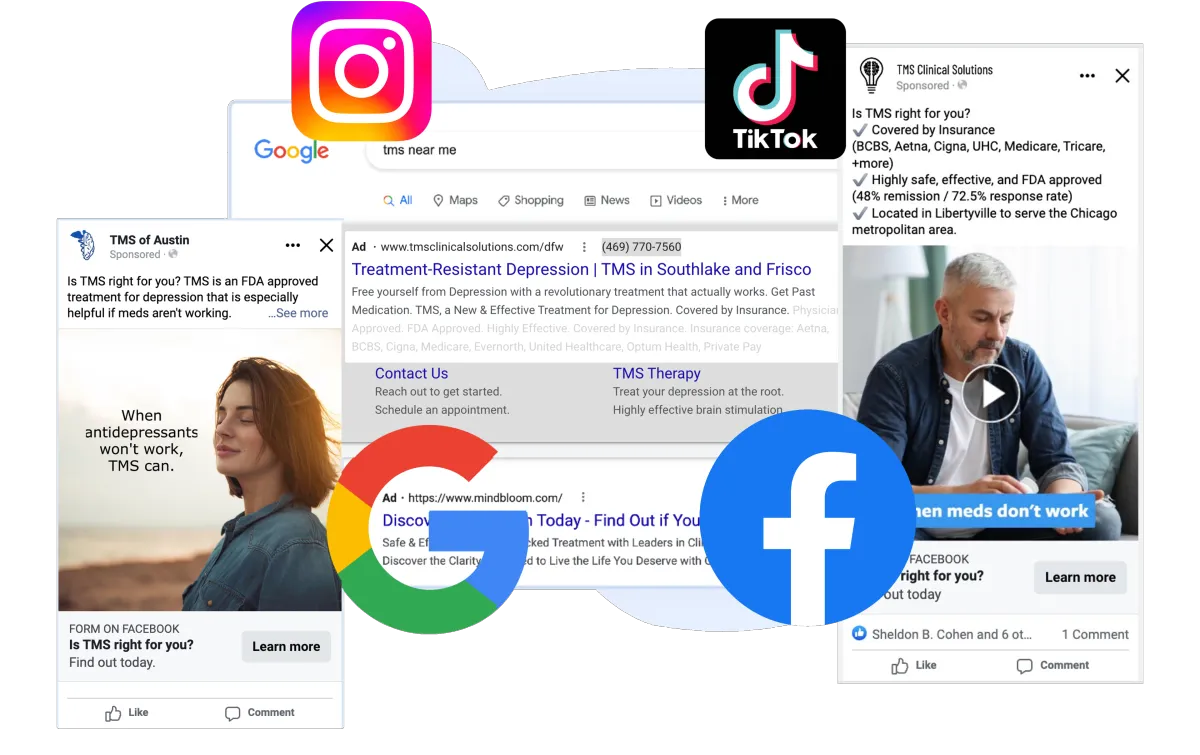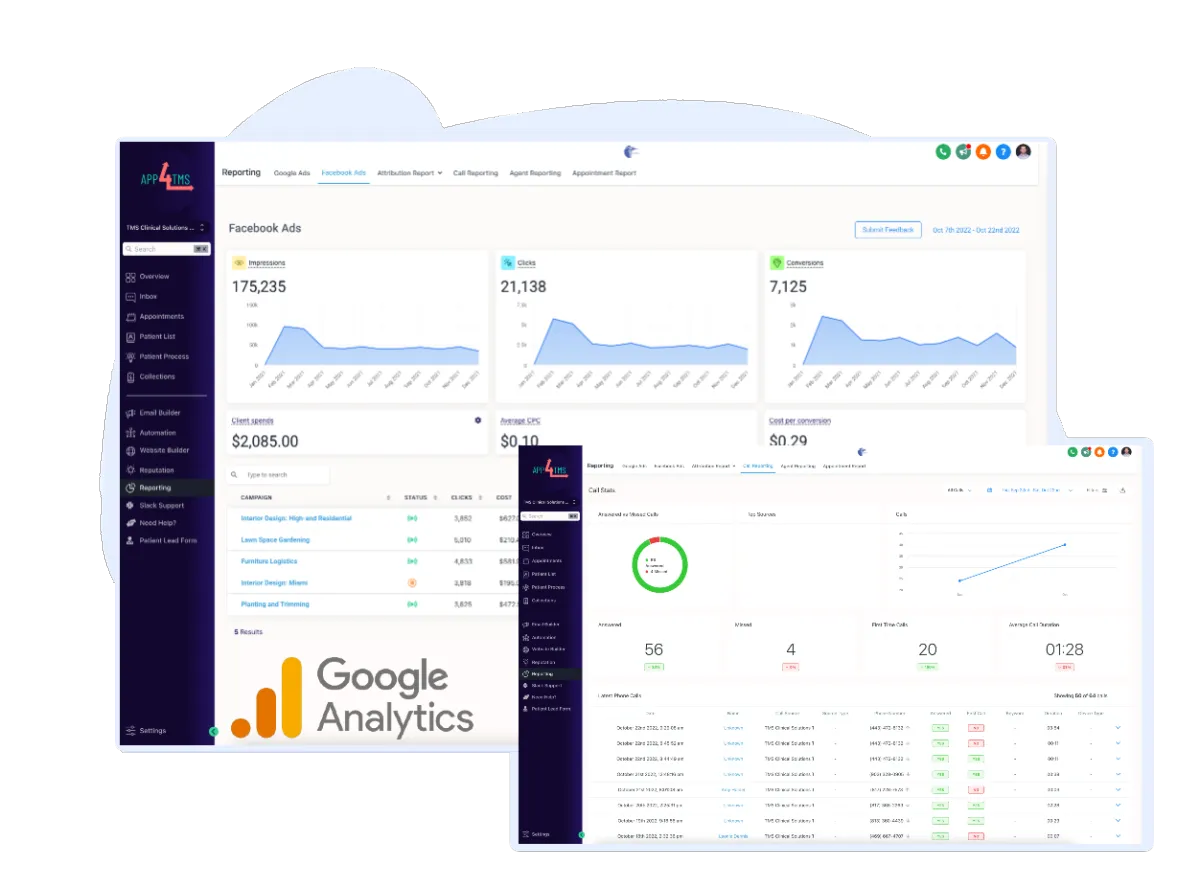Transform Your Mind With Our TMS device and marketing program.
We get Depression, Anxiety and OCD patients for you
Transform Your Mind With Our TMS device and marketing program.
We get Depression, Anxiety and OCD patients for you
Signed in as:
filler@godaddy.com
We get Depression, Anxiety and OCD patients for you
We get Depression, Anxiety and OCD patients for you
.What can our team do for your practice?
Run effective ads

With never-ending optimization, our Google, Facebook, Instagram, and TikTok ads have been perfectly crafted to capture patients looking for TMS.
Create stunning websites

Our websites and landing pages are meticulously designed to match your brand and messaging. We use anonymous screen recordings, heat maps, and scroll rates to optimize.
Automate everything

Keep your patients and staff engaged with detailed automation from start to finish.
HIPAA-compliant CRM


Guide the patient through the TMS pipeline from "First Contact" to "TMS Treatment Ended." Keep track of all SMS, email, phone calls, and activity in a single box.
Get access here
Real-time Reporting

Our advanced dashboard allows you to track your ad performance, attribution, agents, calls, conversion rates, and ROI.

At Brainwave, we believe that health is not just the absence of disease, but a state of complete physical, mental, and social well-being. We strive to promote holistic health and wellness through our services and patient education programs.

Our team of medical professionals has years of experience in their respective fields, and are constantly updating their skills to stay up-to-date with the latest medical advancements. We are committed to providing the highest quality care to our patients.
OVERVIEW
Transcranial magnetic stimulation (TMS) is a procedure that uses magnetic fie
Our team of medical professionals has years of experience in their respective fields, and are constantly updating their skills to stay up-to-date with the latest medical advancements. We are committed to providing the highest quality care to our patients.
OVERVIEW
Transcranial magnetic stimulation (TMS) is a procedure that uses magnetic fields to stimulate nerve cells in the brain to improve symptoms of major depression. It's called a "noninvasive" procedure because it's done without using surgery or cutting the skin. Approved by the U.S. Food and Drug Administration (FDA), TMS usually is used only when other depression treatments haven't worked.
The FDA also approved TMS for obsessive-compulsive disorder (OCD), migraines and to help people stop smoking when standard treatments haven't worked well. Research continues into other potential uses for TMS, including epilepsy.
When used for depression, OCD and to stop smoking, this treatment involves delivering repeated magnetic pulses, so it's called repetitive TMS or rTMS.
How it works
Repetitive transcranial magnetic stimulation (rTMS)
Enlarge image
During an rTMS session for depression, an electromagnetic coil is placed against the scalp of your head. This coil delivers magnetic pulses that stimulate nerve cells in the region of your brain involved in mood control and depression. It's thought to activate regions of the brain that have decreased activity during depression.
You also may hear the term "deep transcranial magnetic stimulation" or "deep TMS." The difference between rTMS and deep TMS has to do with the type of coil used. The deep TMS coil stimulates deeper and wider areas of the brain, compared with rTMS. Deep TMS coils have been FDA-approved for OCD and to stop smoking.
Although the biology of why TMS works isn't completely understood, the stimulation appears to affect how the brain is working. It seems to ease depression symptoms and improve mood.
There are different ways to perform TMS. Methods may change as experts learn more about the most effective ways to perform treatments.
Why it's done
Depression is a treatable condition. But for some people, standard treatments aren't effective. Repetitive TMS may be used when standard treatments such as medicines, and talk therapy, known as psychotherapy, don't work.
TMS is sometimes used to treat OCD, migraines and to help people stop smoking after other treatments have not been successful.
Risks
Repetitive TMS is a noninvasive form of brain stimulation. Unlike vagus nerve stimulation or deep brain stimulation, rTMS does not require surgery or implanting electrodes. And, unlike electroconvulsive therapy (ECT), rTMS doesn't cause seizures or memory loss. It also doesn't require the use of anesthesia, which puts people in a sleep-like state.
Generally, rTMS is considered safe and well-tolerated. However, it can cause some side effects.
Common side effects
Side effects are generally mild to moderate and improve shortly after a session. Side effects decrease over time with more sessions.
Side effects may include:
Your health care provider can adjust the level of stimulation to reduce symptoms. Or your provider may recommend that you take a pain medicine available without a prescription before the procedure. In some people who get frequent headaches or migraines, TMS triggers headaches, so treatments might need to be stopped.
Uncommon side effects
Serious side effects are rare but may include:
More study is needed to determine whether rTMS may have long-term side effects.
How you prepare
Before having rTMS, you may need a:
These evaluations help make sure that rTMS is a safe option for you.
Tell your health care provider if:
Before your first appointment
Repetitive TMS isn't invasive, doesn't require anesthesia and can be performed on an outpatient basis. While you don't need to arrange for someone to drive you home after treatment, you may prefer to be driven home after the first session to get a sense of how you'll feel afterward.
Before considering treatment, check with your health insurance company to see whether rTMS is covered. Most policies cover rTMS for depression but require certain medical necessity conditions to be met. These conditions include trying a minimum number of antidepressants that have not worked. Repetitive TMS for OCD and for stopping smoking is new enough that most insurance policies don't cover its use for these issues. That may change as its use becomes more widespread.
What you can expect
Repetitive TMS is usually done in a health care provider's office or clinic. It requires a series of treatment sessions to be effective. Generally, sessions are carried out daily, five times a week, for 4 to 6 weeks.
Your first treatment
Before treatment begins, your health care provider will need to identify the best place to put the magnet on your head and the best dose of magnetic energy for you. Your first appointment usually lasts about an hour.
During your first appointment, the "mapping" process is performed. Here's what you can likely expect:
During each treatment
The coil placement and dose are usually done only once. This occurs during the first treatment. For all later treatments, the magnet is moved to the treatment position using measurements from the first treatment.
Here's what to expect during each treatment:
After each treatment
You can return to your normal daily activities after your treatment. You might have a headache for a short time afterward. Between treatments, you can usually expect to work and drive.
Results
If rTMS works for you, your depression symptoms may improve or go away completely. Symptom relief may take a few weeks of treatment.
The effectiveness of rTMS may improve as researchers learn more about techniques, the number of stimulations needed and the best sites on the brain to stimulate.
Ongoing treatment
After completing an rTMS treatment series for depression, standard care — such as medicine and talk therapy — may be recommended as ongoing treatment.
It's not yet known if maintenance rTMS sessions will benefit your depression. This involves continuing treatment when you are symptom-free with the hope that it will prevent the return of symptoms.
If your depression improves with rTMS for at least 2 to 3 months and then you have symptoms later, you can repeat rTMS treatment. Most insurance companies will cover repeat treatment.

We offer the best TMS device on the market. We have onsite training as well as marketing strategies to improve your patient flow. Please call us to see if you territory is available.
Brainwave
3070 Windward PKY
Suite F
Alpharetta Ga 30005
848-400-0411
Open today | 09:00 am – 05:00 pm |
Sign up to hear from us.
Copyright © 2019 Brainwave - All Rights Reserved.
We use cookies to analyze website traffic and optimize your website experience. By accepting our use of cookies, your data will be aggregated with all other user data.